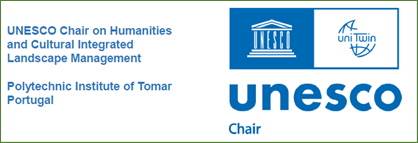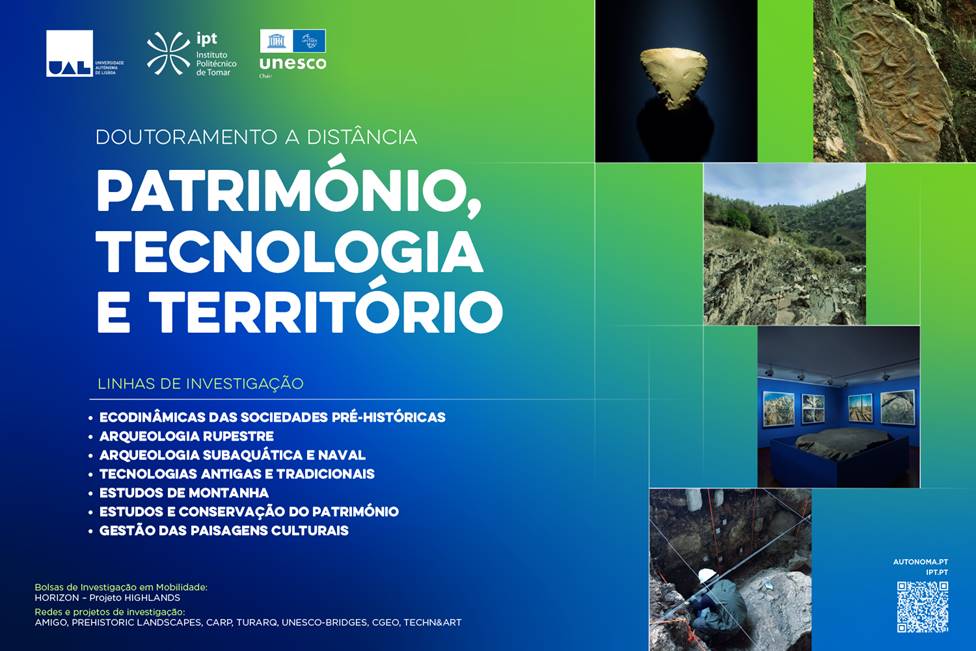O Doutoramento em Património, Tecnologia e Território (DPTT) é um programa de investigação e formação avançada oferecido pela Universidade Autónoma de Lisboa e pelo Instituto Politécnico de Tomar, com colaborações académicas em todos os continentes. O DPTT é uma formação inovadora, em modelo de Ensino a Distância que foca a relevância das materialidades patrimoniais para a dinâmica, resiliência e sustentabilidade das sociedades humanas. Entende-se nesse processo duas dimensões: a tecnologia (materiais humanos) e o território por um lado, e por outro, a construção de paisagens culturais em torno da patrimonialização dos produtos de antigas tecnologias. A materialização do comportamento exprime-se pelas técnicas que formam as identidades culturais e se perenizam sob a designação de património. Esse património, ao mesmo tempo tangível e intangível, inscreve as identidades culturais no território de que emerge e nas rotas de intercâmbio de cada sociedade. A compreensão deste processo levou à reflexão da academia internacional e de entidades como a UNESCO a introduzir conceitos como o de paisagem cultural. Consequentemente, são propostos novos instrumentos de gestão integrada dos territórios e a criação de instrumentos de promoção da sustentabilidade que mudem o paradigma (como o programa BRIDGES). Assim, o DPTT criará qualificação avançada em contexto de investigação, articulado com os centros de I&D CGeo e Techn&Art, a Cátedra UNESCO-IPT Humanidades e Gestão Cultural do Território e a Cátedra UAL História e Cultura Luso-Brasileira. O DPTT preparará os doutorandos para a sua autonomia, autoaprendizagem e desenvolvimento de competências transversais com foco no trabalho em equipa. Os doutorandos serão associados a um dos centros I&D, de acordo com a sua pesquisa. Da mesma forma, participarão numa ampla rede de universidades e outras entidades parceiras como a UNESCO, para que a sua pesquisa, por um lado, tenha acesso a uma ampla rede de investigadores, instrumentos analíticos e referências teóricas e por outro, se inscreva num quadro amplo de estudos comparados. No final, o DPTT formará quadros teoricamente robustos e com competências críticas aptos a desenvolverem investigação aplicada a contextos territoriais bem delimitados, que contribuam para o seu desenvolvimento integrado. | The PhD in Heritage, Technology and Territory (DPTT) is an advanced research and training program offered by the Autonomous University of Lisbon and the Polytechnic Institute of Tomar, with academic collaborations on all continents. DPTT is an innovative training, in a Distance Learning model, that focuses on the relevance of heritage materialities for the dynamics, resilience and sustainability of human societies. Two dimensions are understood in this process: technology (human materials) and territory on the one hand, and on the other, the construction of cultural landscapes around the patrimonialization of products of ancient technologies. The materialization of behavior is expressed by the techniques that form cultural identities and are perpetuated under the designation of heritage. This heritage, at the same time tangible and intangible, inscribes cultural identities in the territory from which it emerges and in the routes of exchange of each society. The understanding of this process led to the reflection of the international academy and entities such as UNESCO to introduce concepts such as the cultural landscape. Consequently, new instruments for integrated management of territories and the creation of instruments to promote sustainability that change the paradigm (such as the BRIDGES programme) are proposed. Thus, the DPTT will create advanced qualification in the context of research, articulated with the Centers of R&D CGeo and Techn&Art, the UNESCO-IPT Chair in Humanities and Integrated Cultural Landscape Management and the UAL Chair History and Culture Luso-Brazilian. DPTT will prepare doctoral students for their autonomy, self-learning and cross-cutting skills development with a focus on teamwork. Doctoral students will be associated with one of the R&D centers, according to their research. Likewise, they will participate in a wide network of universities and other partner entities such as UNESCO, so that their research, on the one hand, has access to a wide network of researchers, analytical instruments and theoretical references and, on the other, registers in a broad framework of comparative studies. In the end, the DPTT will form theoretically robust profiles with critical competencies capable of developing applied research to well-delimited territorial contexts that contribute to its integrated development. |

![]() dout_patrimonio_tecnologias_territorio_2023.jpg
dout_patrimonio_tecnologias_territorio_2023.jpg

